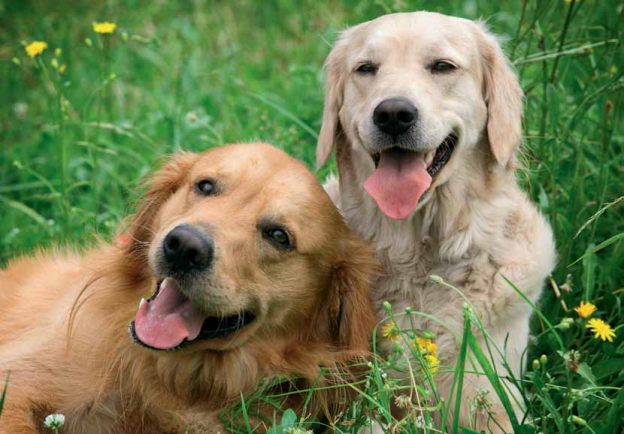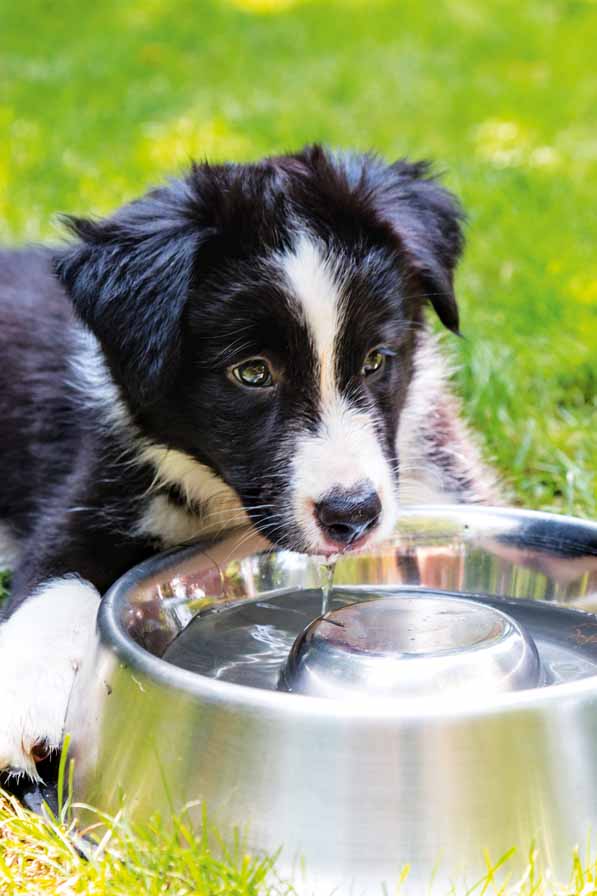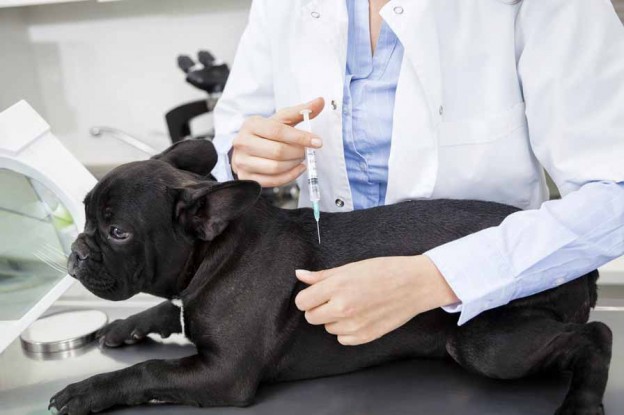With so many opinions and advice on dog nutrition, Dogs Life spoke to experts to get the facts on what your dog needs in its diet to maintain optimal health. Michelle Minehan reports on dog diet for each stage.
As there are three prominent phases or stages in a dogs life, in relation to nutrition its important their diet is appropriate to each life stage. Puppies, adult dogs and seniors have different nutritional needs and Dr Elissa Kadar, University and Conference Manager at Hills Pet Nutrition, spoke to Dogs Life to sort out the facts and what we really need to know.
Puppies, adults and seniors have completely different dietary requirements, Kadar said. The most appropriate diets are life stage specific: this means the diet has been formulated to meet the exact requirements of each particular stage in a dogs life.
Puppy diet
As with all stages of a dogs life, diets for puppies are not simple to formulate, Kadar said. There isnt one precise diet any pet owner should stick to, as there are many different factors to consider when deciding what diet to put your puppy on. A complete and balanced puppy or growth diet should be fed to all dogs up to 12 months of age; after that, the diet changes to adult, she said.
Puppies require more protein and calories than adult dogs to support growth and maturation, she said. They also have special requirements for the amounts and ratio of calcium and phosphorous in their diet.
This is why its vital puppies be fed a complete and balanced puppy diet that has been formulated to meet their exact needs. Don’t forget: although they’re all pups, diets need to be specific for the size of dog they will develop into.
Large breed puppies have their own special requirements, as they grow very rapidly, she continued. Diets formulated for large breed puppies have a controlled level of calories, calcium and phosphorous to allow proper bone and muscle development.
Every puppy diet should contain appropriate levels of DHA (docosahexaenoic acid), a type of Omega 3 fatty acid which is extremely important for both brain and vision development. DHA is a fatty acid that’s vital in brain and vision development and should be included as part of a complete and balanced diet for the puppy stage, she said. Both the mother, during pregnancy and when shes feeding the puppies, and the puppy should have appropriate levels of DHA in their diet.
Kadar stressed the importance of not adding extra supplements as this will unbalance the diet which has been specially formulated to provide neither too much nor too little of any nutrient.
Adult dog diet
Small and medium breed dogs should remain on an adult diet from one to seven years of age. When they reach seven, veterinarians recommend dogs to switch to senior diets to cater for their specific needs. It is important to recognise, though, that dogs that weigh more than 25kg as adults are classified as large breeds that have a shorter life span; therefore, these dogs should be switched to a senior diet at five years of age.
Adult dogs require fewer calories and less protein and calcium than puppies as they are no longer growing, Kadar said. Remember this when switching to an adult diet. If its not catered for, your dog could end up overweight and with health problems associated with being overweight.
A complete and balanced adult diet will give them all the energy and nutrition they will need, although some dogs will develop special requirements as adults depending on their lifestyle, she said. She explained, for example, how working dogs have different dietary requirements from dogs that are couch potatoes and do not get much exercise.
Senior dog diet
Senior dogs, on the other hand, have much lower energy requirements than adult dogs and puppies and need to follow a special diet as they’re more prone to develop a variety of diseases. Diets for senior dogs should contain controlled levels of energy, phosphorous, protein and salt, Kadar said. This will ensure they stay as healthy as possible for as long as possible.
Senior dogs should eat food containing high amounts of antioxidants, as these tend to slow down the ageing process and help keep older dogs healthier. Special diets can be prescribed by veterinarians to meet the needs of senior dogs with diseases such as cancer, cognitive dysfunction all of which are quite similar to senility in humans, she said.
Incorrect diets cause problems
Just like humans, dogs can suffer from a range of different health problems in life if they don’t follow a correct diet throughout all stages of their lives, Kadar said. Because they do the majority of their developing as puppies, this is when many health problems can develop.
Puppies that are predisposed to develop bone problems like hip dysplasia can be made worse by not feeding an appropriate diet as they grow, she said. Incorrect feeding of a puppy can also result in growth deformities and gastrointestinal upsets.
The most common problem associated with dogs and their diet is being overweight or obese. Kadar said its very easy for adult dogs to become overweight (especially breeds prone to it, such as Labradors) if they’re not fed appropriately.
Not only does it keep them looking good, but maintaining a healthy weight for your pooch can result in fewer health problems later in life such as arthritis, breathing problems and many other disorders. A healthy diet also ensures a healthy-looking coat as poor nutrition can lead to flaky, pale-looking coats.
Senior dogs are more susceptible to a variety of other diseases, said Kadar, and its especially important to seek out an appropriate diet for senior dogs or seek advice from a veterinarian if owners suspect their dog may need a special diet to address a health issue.
NATURAL vs PROCESSED
Many different opinions circulate in the pet industry about whether dogs should be fed natural or processed food, but Dr Elissa Kadar from Hills Pet Nutrition said as long as dogs are receiving the correct amount and balance of nutrients then the choice is up to the individual owners.
Commercial diets generally contain natural ingredients to provide the nutrients in the appropriate amounts and proportions, she said. Most are naturally preserved as much as possible. They are safe to feed, unlike raw foods which can transmit food-borne infections and are very difficult to provide in a complete and balanced fashion.
Natural is a catch phrase that appeals to most of us; however, processed food can most certainly be natural in that it contains no synthetic ingredients.
Tips for maintaining a healthy pooch in all life stages – Dr Elissa Kadar, Hills Pet Nutrition
Puppies
An ideal diet is a premium diet specifically intended for puppies or growth. Typically, a veterinarian can give the best dietary advice during a puppys vaccination appointments and puppy owners should ask their vet any questions they have about diet at that time.
Large breed puppies that is, dogs that will attain an adult weight more than 25kg should be fed on a premium diet that states its intended for large-breed puppies.
Dry kibble is often the most convenient to feed and, provided the diet is complete and balanced for growth, its unnecessary to add anything at all to the diet aside from having fresh water available at all times.
Encourage daily activity and avoid overfeeding. Its especially important not to allow puppies to become overweight as this will increase their chances of developing health problems, particularly with their bones and joints. If the owner is unsure if their puppy is the right weight, a quick check by a vet or veterinary nurse can resolve the issue; they can also recommend an appropriate adjustment in the amount fed daily if required.
We often replace attention with treats as we lead such busy lives. Puppies crave our attention and time and treats for training need only be tiny.
Adults
Adult dogs should ideally be fed a premium diet intended specifically for the maintenance of adult dogs, usually one to seven years of age.
If feeding commercial food, owners should check the label on the bag to be sure it contains this information. A label that states the food is intended for all life stages means it has been formulated to meet the requirements of growing puppies and will contain excess calcium, energy and protein for an adult dog.
Again, kibble is generally most convenient and no additional food is required if the product is complete and balanced. Over the long term, kibble is probably better for dogs teeth than canned food.
Canned food for adult dogs can be mixed with the dry food if the owner prefers. This means the amount of dry food fed daily will need to be decreased.
For certain breeds prone to obesity a light adult diet, restricted in fat and calories, may be preferable during adult years.
Keep treats and snacks to a minimum. Dogs love attention and your time; usually we are feeding treats out of habit.
Avoid feeding human food as this can become a habit for your dog and lead to weight problems.
It’s hard work to get a dog to lose a substantial amount of weight and much easier and healthier to avoid weight gain in the first instance.
Seniors
Senior dogs (older than age seven in small and medium breeds and greater than age five in large breeds) have decreased calorie requirements and senior diets are especially formulated to meet the decreased energy needs of older dogs.
Again, encouraging consistent daily walks and sticking to a feeding routine of the appropriate amount of a premium diet will help avoid weight gain in senior pets.
Many older dogs suffer from arthritis and keeping seniors trim will help enormously in the management of this disease.
Diets intended to aid in the management of health issues such as dental disease, kidney disease and cancer that occur commonly in older dogs can be prescribed by a veterinarian.
Although there are many different diets to put your dog on, its not possible to meet the requirements of all life stages with a single diet. Doing so could result in excess or inadequate nutrition, depending on the age of the dog, Kadar said.
Complete and balanced means the diet contains every nutrient required by the dog at each life stage and, when the diet is fed to meet their energy requirements, they will have the perfect balance of nutrition.







